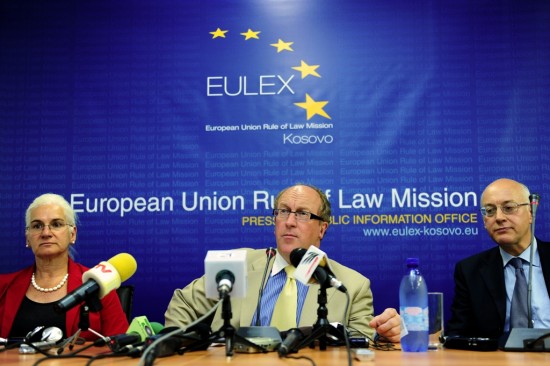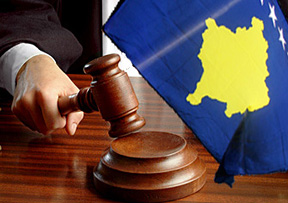 Andrea Lorenzo Capussela replies to Doniqe Qerimi’s post on the legality of the extension of the mandate of foreign judges who sit in Kosovo’s Constitutional Court, reaching opposite conclusions and arguing that the President’s actions would justify her impeachment. “For the EU, appointing judges to the Constitutional Court would amount to recognizing it and, with it, also Kosovo’s independence. So EULEX and the EU never had, do not have, and do not want to have a power to appoint constitutional judges”, is one of the arguments he puts forward.
Andrea Lorenzo Capussela replies to Doniqe Qerimi’s post on the legality of the extension of the mandate of foreign judges who sit in Kosovo’s Constitutional Court, reaching opposite conclusions and arguing that the President’s actions would justify her impeachment. “For the EU, appointing judges to the Constitutional Court would amount to recognizing it and, with it, also Kosovo’s independence. So EULEX and the EU never had, do not have, and do not want to have a power to appoint constitutional judges”, is one of the arguments he puts forward.
Read all the posts concerning the Kosovo Constitutional Court debate here.

I disagree with Donikë Qerimi’s post on this matter in this blog, and with her forceful last words: the conclusions she reaches should be clear, she says, “at least to anybody who understands law.” Touché: I reached different conclusions – in articles published a dozen days ago in Kosovo’s press and elsewhere – but cannot claim any expertise in Kosovo law. Yet I think that ordinary logic and some plain general principles are sufficient to cast at least some doubt on Qerimi’s confident arguments, for the question really is rather simple, and refreshingly free of legal intricacies.
So you are about to watch a duel between two mutually incompatible arguments, leading to diametrically opposite conclusions: it will be easy for the widowed queen to decide which knight has prevailed, and should inherit the kingdom (Qerimi is a woman, of course, but that’s no obstacle as women famously can be knights, and valiant too: think of Bradamante in Ariosto’s Orlando furioso). So let’s survey the ground set for the duel: what both knights agree about.
We agree on the facts. There were three internationally appointed foreign judges in the constitutional court. Their mandates survived the end of Kosovo’s international supervision. When their original term expired, at the end of August, a decree of the president of that country extended it by two years. I would only add – for this is useful to the illustration of my argument – that when international supervision ended, in September 2012, Kosovo’s parliament cleaned up the constitution of all references to it: a transitional provision, however, provided that all officials appointed by Kosovo’s international supervisor, the ICO, “shall continue to carry out their functions in the institution for the specified term of appointment.” This applied also to the three judges, who had been appointed by the ICO.
We also agree that the president’s decree was based on an exchange of letters between Kosovo and the EU, which was ratified by Kosovo’s parliament; and that its terms have the object and effect of overriding the provisions of Kosovo’s laws and constitution that regulate the same matter differently. This point is perhaps debatable, for it is not entirely clear whether the exchange of letters can be viewed as an international agreement (because one of the two sides, the EU, does not regard the other side, Kosovo, as a sovereign state: more on this below); nor is it clear up to which point a real international agreement could, as a matter of Kosovo’s constitutional law, override any provision or principle of the constitution. But let’s set both points aside, and take the solutions most favourable to Qerimi’s argument as assumptions (even though the first one seems heroic).
Finally, the rule of the constitution that, in Qerimi’s line of reasoning, was superseded by the exchange of letters provides that constitutional judges are appointed by the president of Kosovo upon a proposal by parliament, for which a special (two-thirds) majority is required. This applies to all nine judges: there is no special requirement to have three foreign ones, nor any special provision governing the appointment of non-Kosovar judges. Under this rule the president can probably reject the parliament’s nominees, but can certainly make no appointment without a proposal supported by a two-thirds majority vote.

The duel is about this question: does the exchange of letters grant to the president the power to appoint constitutional judges without a proposal by parliament? In Qerimi’s approach, this question can be divided into two sub-questions: does the exchange of letters grant the EU rule-of-law mission in Kosovo (EULEX) the power to select some constitutional judges? Is such selection a sufficient – whether or not it is also necessary, as Qerimi’s argument suggests – basis for the president to make such appointments?
A few words are therefore necessary also on EULEX. This mission does not recognise Kosovo as a sovereign state because, just like the UN, also the EU has taken a position of “neutrality” in respect of Kosovo’s independence, sovereignty and international status. Accordingly, EULEX operates on the basis of the Security Council resolution that, after the 1999 conflict, granted to the UN all powers of government in Kosovo, legislative, executive and judicial: in the words of the mission’s own website, “EULEX works within the framework of UN Security Council Resolution 1244.”
Qerimi answers ‘yes’ to both sub-questions. In short, she argues that the exchange of latters granted EULEX the power to select some constitutional judges – thus depriving the parliament of this power – and granted the president the power to formalise their appointment.
Let’s then first look at what the exchange of letters says. This document concerns the renewal of EULEX’s mandate and the reduction of its functions (paragraphs 2–4), in view of a probable withdrawal in June 2016. Its main focus are EULEX’s own officers – judges, prosecutors, policemen – that perform official functions in Kosovo’s rule-of-law institutions (paragraphs 2 and 5). Paragraph 6 contains the delegation to EULEX of the power to select such officers, and specifies that “as President, it is my duty to ensure that any such delegations are clearly enumerated.” The only reference to the constitutional judges appears in paragraph 7, in which the president “confirms” both the EULEX judges and prosecutors appointed under a previous exchange of letters, and the constitutional judges appointed by the ICO.
None of this assists Qerimi’s conclusions. When the exchange of letters was written, no constitutional judge could plausibly be described as EULEX’s: the mission had not selected or appointed them, had no managerial, supervisory or other role about them, and had no power or mandate to appoint them on the basis of the EU Joint Action that regulates it. Indeed, such a power would be incompatible with the EU’s “status neutrality”, for the court – unlike the ordinary ones, which pre-existed Kosovo’s independence and didn’t change after it – is a creation of Kosovo’s independence: it did not exist in the world regulated by UN Security Council Resolution 1244, which sets the bounds of the legal framework within which EULEX is allowed to operate. EULEX’s judgements, in fact, are issued “In the name of the people”, without specifying which to people, or in which state, they are rendered (this rather gauche formula is recently less frequently used).
Its judges did “advise” Kosovo’s supreme court to accept the supremacy of the constitutional court’s rulings, but the mission never explicitly recognized it. Appointing judges to it would amount to recognizing it and, with it, also Kosovo’s independence. So EULEX and the EU never had, do not have, and do not want to have a power to appoint constitutional judges. This does not mean that EULEX’s management might have thought that they had such a power based on their reading of the exchange of letters, but this is their – mistaken, I think – opinion.
The only plausible way to interpret that “confirmation” is to read it as a restatement of what the parliament had already decided in 2012: namely, that the three foreign constitutional judges would have remained in office for the duration of their original term. The confirmation makes sense for the existing “EULEX judges and prosecutors”, who had been appointed through a slightly different procedure than that envisaged by the exchange of letters: the confirmation, in fact, is followed by a paragraph stating that EULEX remains free to replace such existing “judges and prosecutors”, but shall have to do so according to the new procedure. Thus, the confirmation really applies only to them, not to the constitutional judges, for the simple reason that the exchange of letters contains an appointment procedure that applies only to the former, not to the latter: the clear functional and logical link between confirmation and new procedure leaves little doubt about that.
If the queen is not yet convinced, may she consider also a more systematic argument. As the exchange of letters overrides the constitution, it must be interpreted narrowly – as the president herself explicitly said in paragraph 6 of her letter to the EU: the delegation of powers must be “clearly enumerated” – so as to limit the derogation of the constitution to what is strictly necessary to implement it. In the exchange of letters there is no explicit – much less “clearly enumerated” – delegation of powers concerning constitutional judges. So, this exchange or letters cannot be read as derogating from the constitutional rules on the appointment of the constitutional judges. The constitution wants all members of the highest guardian of the rule of law – which can annul laws, impeach presidents and dissolve parliament – to be proposed by parliament after a public debate and upon a two-thirds majority vote, which de facto allows the opposition a veto. Can such a cardinal rule be overridden by a superfluous “confirmation”?
Qerimi indirectly confirms this interpretation, when she writes that “the Assembly of Kosovo, the institution vested with the power to propose Constitutional Court judges to the President for appointment, found it extremely hard to choose new judges” to replace the three foreign ones. This is why international (EU) assistance was sought. So there was no clear, previous policy choice to resurrect a fragment of international supervision. What we observed, conversely, is the hurried attempt (on the last day of their mandate) to solve an eminently political domestic difficulty in appointing new judges: a difficulty that became an impossibility in early July, when Kosovo’s parliament and institutions fell into an apparently insoluble deadlock that continues to this day. No such deadlock existed in April, when the exchange of letters was made and five months remained to appoint new judges before the old ones expired.
It is certainly possible – as Qerimi argues – that the persons who wrote the text of the exchange of letters wanted to grant EULEX and the president the power to appoint constitutional judges. But this is not the objective meaning of the words they used, and which the parliament ratified. And as parliament ratified them in the space of one morning – during which the two separate debates and readings of the draft law that parliamentary procedure requires were held, breaching the rule whereby at least one week (or more) must separate the two votes – there is no way to even argue, much less prove, that parliament understood that text to mean what it does not say. I wouldn’t overhaul Kosovo’s constitutional system and re-subject it to (indirect) international supervision by sleight of hand only because those persons might not have written what they actually wanted to say.
If my argument prevailed, then the president’s decree has breached the constitution. A serious breach, on account of both its nature and its effects, which justifies the president’s impeachment: by illegally appointing three constitutional judges, she discredited the presidency, the court, and the very notion of the rule of law; she illegally altered the composition of a crucial organ of the state, and influenced all its future decisions. It is hard to imagine a more serious breach on the part of a president.
I also wonder whether the decree, albeit illegal, may be regarded as provisionally effective: until, that is, someone (the court?) declares it invalid. But this issue – on which the questions whether those judges are, in fact, judges, and whether the court can still function (including, for instance, to decide the impeachment of the president), depend – is a complex question of Kosovo law, which must be left to the experts.
I would note, rather, that this case is a good illustration of the combination of malfunctioning institutions, political weaknesses and international influence that can still be observed in Kosovo, whose effects are magnified by a general inclination to prefer superficial correctness – EULEX’s letter to the president, her formally impeccable decree – over the democratic principle, and to favour quiet, discreet solutions to public, transparent debate about the country’s problems (which can probably solve them more effectively and sustainably, if perhaps in an apparently messier way).
Note: This article gives the views of the author, and not the position of LSEE Research on SEE, nor of the London School of Economics.
_______________________
Andrea Lorenzo Capussela has a PhD on competition policy. After a few years in the private sector, he served as the head of the economics unit of Kosovo’s international supervisor, the International Civilian Office, in 2008–11, and as the adviser to Moldova’s economy minister and deputy prime minister, on behalf of the EU. He then took a sabbatical period, during which he wrote one book (State-building in Kosovo: Democracy, EU Interests and US Influence in the Balkans, I.B. Tauris: London, forthcoming), is conducting research on another one, and is doing some voluntary work on the development of a district in Calabria, Italy’s most depressed region.




From the point of view of legal theory Andrea Lorenzo Capussela’s analysis is 100% correct and I agree utterly with his legal opinion. Still, one slight remark has to be added: latest with accepting the new composition of the Special Chamber of the Supreme Court of Kosovo on Kosovo Trust Agency Related Matters (and the Court’s new name) as established from 1st of January 2012 some officials of EULEX Kosovo actually – by not advising the Head of Mission and Brussels to withdraw the Mission’s judges from the SCSC – acknowledged the right of the “Republic of Kosovo” to issue, promulgate and implement new laws and set up new courts without the blessing of the SRSG. This might be seen as a clear violation of the Mission’s status neutrality as it could be understood as equaling a recognition of the RoK as such. Sometimes action speaks louder than words. It seems like in the “real world” legality and certain principles of Rule of Law are ideas that are handled very flexible even by those who are paid to protect them…